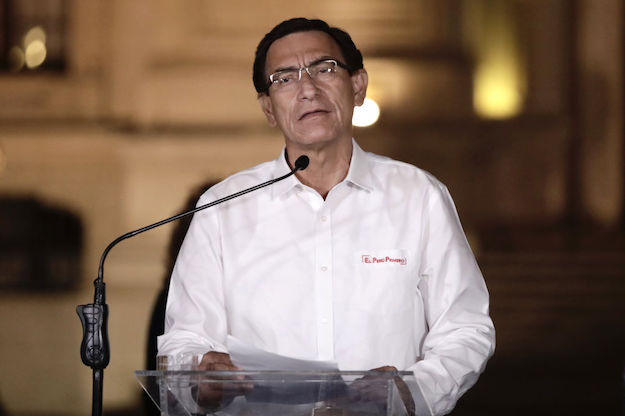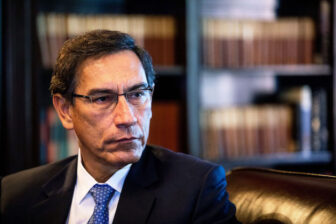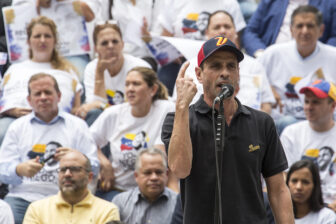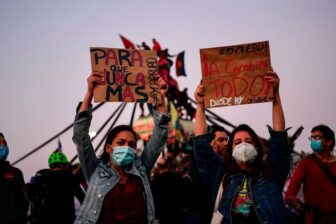Among the many ironies of Peruvian politics, let’s start with this: Martín Vizcarra was one of the most popular presidents of his generation. Even as Peru faced one of the deadliest COVID-19 outbreaks in the world, and lived through an extremely harsh lockdown, his approval remained above 50%, among the highest ratings in Latin America. And yet, going against the will of the three-quarters of Peruvians who thought he should stay in charge, Peru’s Congress shocked many by voting Monday to remove him from office. Manuel Merino, the speaker of Congress and main instigator, was set to assume command in a rushed ceremony, amidst accusations that his actions amounted to a coup.
What was Merino thinking? How did this happen? And what does it all mean for a country that has been one of Latin America’s top economic success stories over the past 20 or so years, but is now facing the region’s deepest COVID-related recession, and some of its most tumultuous politics, with a presidential election scheduled next April?
Much of the explanation resides in Peru’s recent political history, specifically the unintended consequences of past crises. In 2000, Alberto Fujimori, facing allegations of corruption and other crimes, fled to Japan and resigned the presidency. Outraged, Congress decided not to accept it – and instead declared him absent due to “moral incapacity.” Under Peru’s Constitution, immorality is not an impeachable offence. “Moral incapacity” is a term of art that rather refers to whether the president is suffering from mental disability. Other causes of “absence” include resignation and death – objective criteria to be determined by facts rather than through a political trial. Impeachment itself is a different procedure and is reserved for a very limited number of potential causes. Reinterpreting “moral incapacity” to mean literal immorality instead of the traditional mental disability was meant to be a practical fix to a once-in-a-lifetime crisis, but instead, since 2016, it has been turned into a precedent, that can be used and abused by Congress with little to no oversight.
Indeed, Vizcarra himself came to power because of this dynamic – his predecessor Pedro Pablo Kuczynski resigned in 2018 rather than face a second “morality” trial in Congress. Now, Merino is taking advantage of the same dynamic – albeit against a leader who has much more support from the Peruvian people, and at a time of great national (and global) crisis.
Indeed, over the past two years Vizcarra embarked on a series of grand anti-corruption reforms, including trying to fundamentally reduce parliamentary immunity and ban Congressional re-election – both moves that angered Congress. Vizcarra was able to counter-punch more effectively than Kuczynski. He demanded Congress grant him a vote of confidence on a mandate to reform the selection process for the judges of the country’s top court. When Congress refused, Vizcarra took advantage of a different procedural rule and legally dissolved Congress, calling for new Congressional elections in January 2020. More than 80% of Peruvians supported Vizcarra’s move.
But this move, too, had unexpected consequences. Indeed, the long and exhausting war of attrition between Peru’s executive and legislative has left its mark. Just like people all over Latin America (and the world) in the early 21st century, Peruvians want their state to do a better job at providing good public services and fighting against inequality, instead of squabbling over power and personal gain. The results of the January election reflected this frustration. Peruvians massively chastised their political class, choosing newcomers and unexpected political movements. Basically: the bigger a party’s presence in the political scene of the past two years, the worse their chances were of making it into this new Congress. The final results were so unexpected that FREPAP, a fundamentalist theocratic party, won the second-largest share of the vote. Not because Peruvians want to establish an Old Testament theocracy, of course, but rather, because they promised what other more established parties had failed to deliver: Social justice, more security and less inequality.
In the end, the 2020 Congress was no better than its predecessor. The theocrats, autocrats and populists that trickled down through the party lines quickly created problem after problem for Vizcarra. At center stage were debates surrounding Peru’s pension reform, where both public and private options exist, but where neither is able to meet the people’s expectations. Returns on investment tend to be underwhelming and people’s frustration has accumulated over the decades. Congress’ solution was simple and potentially catastrophic: just give the money back to the people, even if it bankrupts the system. Peru’s economy minister, María Antonieta Alva, spent months in a battle to prevent these reforms, even narrowly avoiding impeachment herself.
It was at this point that the new Congress rediscovered the “moral incapacity” clause for removing presidents. In May, Merino mounted an effort to impeach Vizcarra due to a scandal involving the $50,000 hiring of a singer to offer “motivational workshops” at the culture ministry. Vizcarra survived after revelations surfaced that Speaker Merino unsuccessfully reached out to the armed forces asking them to abandon Vizcarra. Merino’s openly coup-ish attitude turned off many, and the motion failed.
But Merino did not give up. Vizcarra was also under investigation for alleged corruption during his stint as regional governor in 2014. After plea bargain testimony leaked arguing Vizcarra received bribes, Merino tried again, arguing that Vizcarra, who had not even been indicted, was too immoral to be president. And this time, he had the votes. On Monday night, Vizcarra yielded, saying he would accept the vote by Congress and not take any legal action to counter it. “I am going home,” he said, surrounded by his cabinet in the courtyard of the presidential residence.
Predictably, Peruvians took to the streets. An unpopular congress evicting a popular president was never going to be good optics. Especially when 68 of 130 Congressmen are also accused of corruption. Many Peruvians see a power grab by Merino, who was next in line given that there were no vice presidents left after the Kuczynski crisis. Some fear Merino might use the ongoing pandemic to postpone the April presidential elections, even though he denies this. Others fear he will try to hijack long-awaited constitutional reforms, by smuggling unpopular provisions on parliamentary immunity and congressional re-election within more popular demands, like the establishment of a senate. With the former head of Congress now leading the executive, there may be no real checks on Congress’ authority to pass any piece of legislation it wants.
Merino’s bet, therefore, seems to be that he can gain the people’s support by accomplishing what none of his beleaguered predecessors did: by passing meaningful legislation. The drawback, of course, is that Merino’s single most important motivation will not be to address the nation’s rampant inequality or social demands, but to get people to like what his government approves, no matter how damaging it may be in the long term. This, in other words, could be a recipe for populism at a time when the so-called Peruvian economic miracle is already hanging by a thread, with the International Monetary Fund projecting a nearly 14% economic contraction in 2020.
Moving forward, as Peruvians take to the streets, it is clear Peru needs a comprehensive reform of its constitutional checks and balances system. A pending constitutional action before the Constitutional Tribunal may offer some solace for future crises. But, for the moment, Peru is the land of short-term thinking and self-serving politicking. Much will depend on how the international community reacts to Merino’s power grab and whether Peruvians can convince their neighbors and partners that this has been, in fact, a coup. But with the world largely distracted, and no one else left to assume the presidency, it looks like it will be difficult months ahead.
__
Gurmendi Dunkelberg is an assistant professor at Universidad del Pacífico and a PhD candidate at University College London








